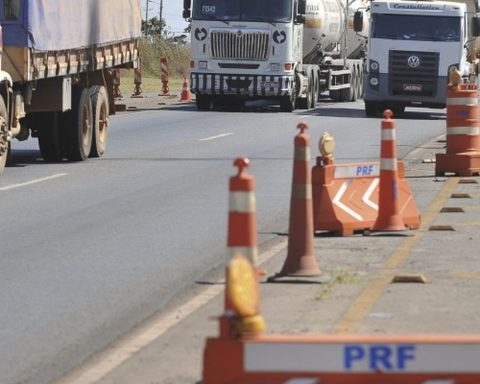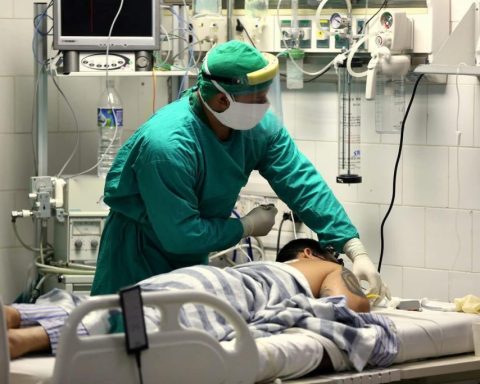The climate tragedy in Rio Grande do Sul (RS) could represent losses of up to R$58 billion in the state itself and R$38.9 billion in other states, with an impact of around R$97 billion on the Brazilian economy this year. There is also a possibility of affecting 9.86% of Rio Grande do Sul’s Gross Domestic Product (GDP, the sum of goods and services produced in the state), with an impact of up to 1% less on Brazil’s GDP.
In the job market, the tragedy caused by the floods could result in losses of 195 thousand jobs in the state and 110 thousand in other units of the federation which, together, correspond to 7.19% of the stock of formal jobs in Rio Grande do Sul and 0.69% in the country.
The estimates are from a study by the National Confederation of Commerce of Goods, Services and Tourism (CNC), released this Thursday (25).
The CNC shows that in addition to affecting economic activity, the tragedy tends to impact inflation and the fiscal dynamics of the entire country. “Commerce, services and tourism will suffer severely if mitigating measures are not implemented effectively,” the study warns.
Daily losses in trade were estimated at R$5 billion, which represents 31.5% of the forecast for May. In terms of infrastructure and supply, which have been hit hard, the forecast is a 28% drop in the flow of cargo vehicles on the roads. Under normal circumstances, the state accounts for 7% of the volume of sales in Brazilian retail.
“Losses in trade could reach R$10 billion, 5% of 2023 revenue,” added the CNC.
Losses to tourism are expected to reach more than R$49 million per day, accumulating up to R$2 billion in losses by June and closing the year with impacts of R$6 billion. “Rio Grande do Sul was responsible for 6% of tourism revenue in Brazil in 2023. The loss of revenue could represent up to 21.4% of the total revenue in 2023 in the state. The compromised transport infrastructure is a major risk, with the interruption of the flow of tourists due to the closure of Porto Alegre airport and affected highways,” points out the CNC.
The agricultural sector, of which Rio Grande do Sul is a major producer, accounts for around 6% of the state’s GDP, with rice production accounting for 1%. “Rio Grande do Sul’s industry, which is important in the transformation of machinery, chemical products and vehicles, will also be affected,” the entity says.
Reconstruction
In the wake of the reconstruction of the state’s economy, the study proposes complementary measures to the federal government’s support package worth R$46.1 billion, including resources, advances on benefits and credit.
According to the CNC, estimates are that the state needs R$19 billion to rebuild its infrastructure. “These efforts need to be complemented by other actions,” argues the CNC.
Jobs
To preserve jobs, the CNC recommends a proportional reduction in working hours and wages; the temporary suspension of contracts with financial compensation; the flexibility of remote work; the anticipation of vacations and the use of time banks.
Credit
In the area of access to credit, the entity highlights the need for a credit program for payroll payments in the form standstill [forma de evitar o pedido de recuperação judicial ou a criação de processos jurídicos individuais por parte dos credores que estão em busca da satisfação de um crédito] for public credit; renegotiation of tax debts and reduction to zero of the banking spread of the National Bank for Economic and Social Development (BNDES).
Taxes
In terms of tax relief, the study points to a 6-month deferral for payment of Simples Nacional and federal taxes and the creation of the Perse-RS Program, with a reduction in rates for the tourism sector until 2027.
According to the CNC, by making estimates and proposing measures for recovery, the institution wants to guide the economic recovery of Rio Grande do Sul and minimize the negative impacts of the climate tragedy.
“The rapid implementation of aid measures is very important to avoid prolonged effects and additional damage to the economy of Rio Grande do Sul and the Brazilian economy as a whole,” argues the president of the CNC-Sesc-Senac System, José Roberto Tadros.
According to the president of the Fecomércio-Sesc-Senac-RS System and 2nd vice-president of the CNC, Luiz Carlos Bohn, the measures must have a resilience bias.
“Rio Grande do Sul has been through a historic tragedy, with losses that are not limited to the current situation. A lot of infrastructure and private capital of families and companies have been destroyed. To mitigate future losses, it is necessary to help everyone who was directly and indirectly affected in the state and, fundamentally, to ensure that this never happens again on the scale seen recently,” he says.
For CNC chief economist Felipe Tavares, “the reconstruction of Rio Grande do Sul will require continuous efforts and substantial investments to restore the economy and lost jobs”.

















